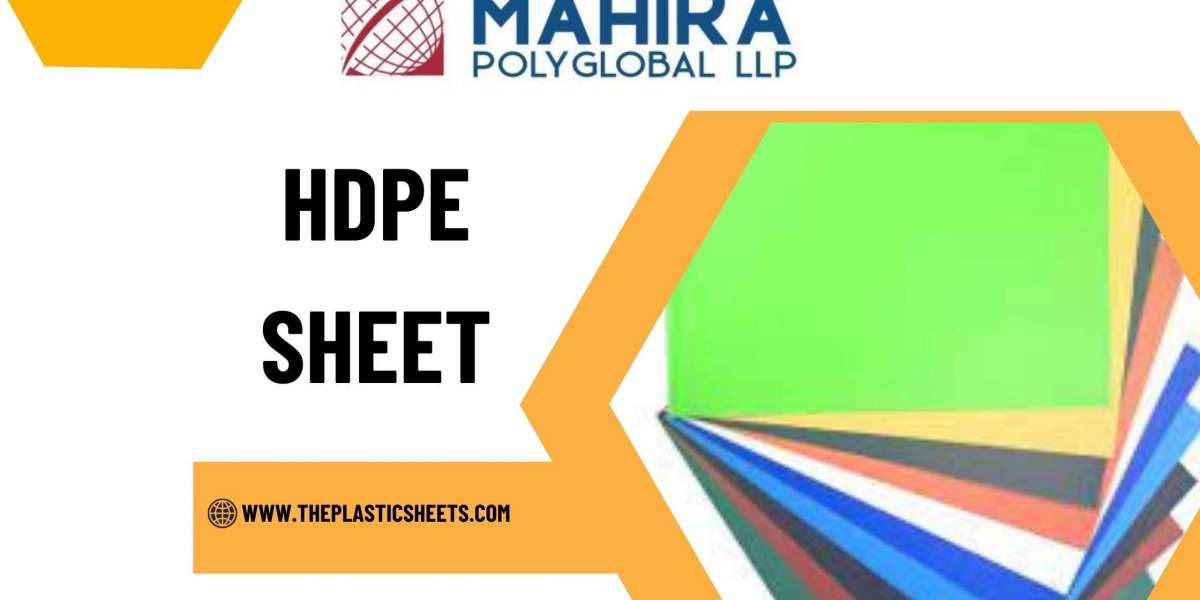High-Density Polyethylene (HDPE) sheets are increasingly recognized as one of the most versatile and durable materials available in the plastic industry. Known for their strength, chemical resistance, and lightweight nature, HDPE sheets are used across a wide range of applications, from industrial to residential settings. This article will explore the characteristics, benefits, and various uses of HDPE sheets, along with insights into manufacturers like Mahira Polyglobal LLP.
What Are HDPE Sheets?
HDPE sheets are made from high-density polyethylene, a thermoplastic polymer produced from petroleum. The density of HDPE gives it a unique structure that offers high impact strength and resistance to various chemicals. Available in different thicknesses and colors, HDPE sheets can be easily fabricated and molded to fit specific requirements. They are commonly used in applications where durability and moisture resistance are paramount.Key Properties of HDPE Sheets
- Durability: HDPE sheets are known for their high tensile strength and impact resistance. They can withstand heavy loads and are less likely to crack or break under stress.
- Chemical Resistance: One of the standout features of HDPE is its ability to resist a wide range of chemicals, including acids, bases, and solvents. This makes it suitable for use in environments where exposure to harsh substances is common.
- Moisture Resistance: HDPE sheets have low water absorption rates, which makes them ideal for applications involving liquids. They do not swell or degrade when exposed to moisture.
- Lightweight: Despite their strength, HDPE sheets are lightweight compared to other materials like metal or wood. This characteristic makes them easier to handle and install.
- UV Resistance: Many HDPE Sheets Plastic come with UV stabilization, allowing them to withstand prolonged exposure to sunlight without degrading or losing their structural integrity.
- Recyclability: HDPE is fully recyclable, which contributes to its sustainability profile. Used HDPE sheets can be reprocessed into new products, reducing waste and environmental impact.
Applications of HDPE Sheets
HDPE sheets find utility in a myriad of applications due to their versatile properties:- Construction: In construction, HDPE sheets are used for wall panels, roofing membranes, and as liners for retaining walls and ponds due to their durability and moisture resistance.
Food Industry: Given their food-safe properties, HDPE sheets are commonly used for cutting boards, food preparation surfaces, and containers that hold food products. - Chemical Storage: The chemical resistance of HDPE makes it an excellent choice for tanks and containers that store hazardous materials or chemicals.
- Marine Applications: In marine environments, HDPE is used for docks, boat components, and other structures exposed to water due to its low water absorption and resistance to corrosion.
- Agriculture: Farmers use Hdpe Plastic Sheets for greenhouse covers, silage bags, and as liners in ponds or reservoirs because they provide excellent protection against UV rays and moisture.
- Signage: The lightweight nature and durability of HDPE make it ideal for outdoor signage that must withstand weather conditions without fading or deteriorating.
Installation of HDPE Sheets
Installing HDPE sheets requires careful planning and execution to ensure optimal performance:- Preparation: Before installation, ensure that the surface where the sheets will be placed is clean and free from debris. This helps achieve better adhesion if adhesives are used.
- Cutting: Use appropriate cutting tools such as circular saws or jigsaws with fine-toothed blades designed for plastic. Always wear safety gear during this process.
- Joining Methods: Depending on the application, HDPE sheets can be joined using mechanical fasteners (like screws), adhesives specifically designed for plastics, or welding techniques such as hot air welding.
- Sealing Edges: For applications involving liquids or chemicals, sealing the edges with appropriate sealants can prevent leaks and enhance durability.
- Regular Maintenance: While Plastic HDPE Sheetss is low-maintenance, periodic inspections should be conducted to check for any signs of wear or damage that may require repairs or replacements.
Sourcing High-Quality HDPE Sheets
When looking for reliable suppliers of HDPE sheets in India, several manufacturers stand out:- Mahira Polyglobal LLP: Known for producing high-quality plastic products including HDPE sheets, Mahira Polyglobal LLP offers a range of options tailored to meet various industrial needs. Their commitment to quality ensures that customers receive durable products suitable for diverse applications.
- Other Manufacturers: Several other companies also manufacture HDPE products across India; however, choosing a reputable supplier like Mahira Polyglobal LLP guarantees adherence to industry standards and customer satisfaction.
Conclusion
HDPE sheets represent a durable solution suitable for an extensive range of applications due to their impressive properties such as strength, chemical resistance, moisture control, and lightweight nature. As industries continue to seek reliable materials that offer both performance and sustainability benefits, the demand for high-quality plastic solutions like those provided by Mahira Polyglobal LLP will only grow. By understanding the advantages of HDPE sheets and how they can be effectively utilized across different sectors, businesses can make informed decisions that enhance operational efficiency while contributing positively to environmental sustainability.
FAQs About HDPE Sheets
1. What are HDPE sheets made from?HDPE sheets are made from high-density polyethylene, a thermoplastic polymer derived from petroleum.
2. What are the benefits of using HDPE plastic sheets?
Benefits include high durability, chemical resistance, moisture resistance, UV stability, lightweight nature, and recyclability.
3. Where can I use HDPE sheets?
HDPE sheets can be used in construction, food processing industries, chemical storage facilities, marine applications, agriculture, signage production, and more.
4. How do you install HDPE sheets?
Installation involves preparing the surface, cutting the sheets accurately, joining them using fasteners or adhesives, sealing edges if necessary, and conducting regular maintenance checks.
5. Why choose Mahira Polyglobal LLP for HDPE products?
Mahira Polyglobal LLP is recognized for its commitment to quality manufacturing practices in producing durable plastic products tailored for various applications across industries.




